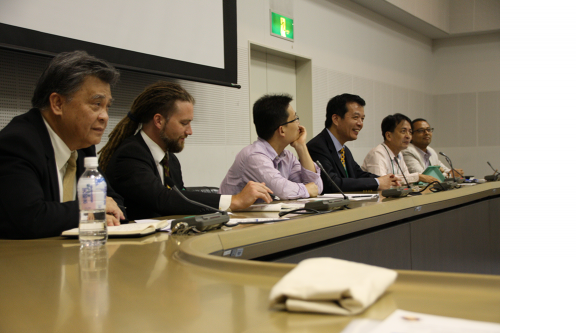On a warm and humid Sunday afternoon on 10th July, 2016 while farmers were laying out their organic produce at the popular farmers’ market in front of United Nations University (UNU) headquarters in Tokyo, a diverse group of students, researchers, and people interested in sustainability entered the building.
They were on their way to the Forum on “Higher Education and the SDGs”, which was organized by ProSPER.Net, an alliance of leading universities in Asia Pacific committed to the transformation of higher education for sustainable development in the region. UNU, and specifically its Institute for the Advanced Study of Sustainability (UNU-IAS), of which ProSPER.Net is a flagship project, is actively contributing to policy research, related to the 2030 Development Agenda with a focus on the implementation of the agenda to achieve the SDGs.
Education at the centre of it all
The Forum highlighted the fact that among the 17 SDGs, as laid down at the UN General Assembly in 2015, SDG 4 – To ensure inclusive and equitable quality education and promote lifelong learning opportunities for all – focused on the importance of quality education.
“Education is basically a mechanism to achieve all the goals.” Kazuhiko Takemoto, Director of UNU-IAS emphasized. “Educating future generations is on the cutting edge to address sustainability challenges.”
Norichika Kanie from Keio University explained some of the underlying problems of the SDGs, such as the lack of ambition and concrete measures to implement the goals, and that there were no legal obligations. He identified four major challenges, (1) the integrated implementation of the goals, (2) multiple levels of governance and vertical linkages, (3) emerging partnerships and (4) the problem of transdisciplinary. All dimensions, social, economic and environmental needed to be integrated into one concept. At the same time planetary boundaries and the depletion of the earth’s resources do not allow for continuous growth.
Mechanisms such as the High Level Political Forum, regional fora like this ProSPER.Net Forum or thematic events such as the Multistakeholder Forum on Science, Technology and Innovation for SDGs facilitated the transfer of knowledge and good practice. An ambassador system with companies for different goals could be an innovative approach to implement the SDGs.
“Integration is key for a 21st century approach to Sustainable Development.” Kanie emphasized during his keynote speech. “We need to define new education programmes around the SDGs.”
ProSPER.Net as a mechanism for SDG implementation
Several ProSPER.Net projects were presented to showcase how universities can help reach the targets set forth in the SDGs. Tony Dalton from RMIT in Australia explained the dilemma of continuous urban growth in the face of increased risk of natural disasters. The project “Built Environment Curricula in the Asia Pacific Region: Responding to Climate Change” addressed Goal 9 (Industry, Innovation and Infrastructure) and Goal 13 (Climate Action). It showcased how green urban development, regulated by governments, allowed for different professions in the sector to collaborate. This project included architects in China and Indonesia, urban planners in Thailand and the Philippines, and civil engineers in Sri Lanka. Across borders and professions, links had been developed to regulate changes in university curricula and to align to one Built Environment code and other sustainable professional practices.
Sivanappan Kumar from the Asian Institute of Technology, Thailand, presented on “Climate Compatible Development in Asian and Pacific Cities.” This project explored ways in which cities can develop action plans and policies to both mitigate and respond to climate change on the municipal level. One of the goals was to develop a framework for tracking the progress on climate action within cities.
The ProSPER.Net project “Health Food Traditions of Asia” on Goal 2 (Zero Hunger) and Goal 3 (Good Health) assessed the increasing health disparity across Asia Pacific. Eni Harmayani from Universitas Gadjah Mada in Indonesia described how rapid lifestyles, aging, and malnutrition in developing countries and transition economies have led to unhealthy diet patterns. The research looked at the socio economic and cultural perspectives to strengthen local production and consumption systems.
The project “Understanding Decentralized Energy Interventions and their Success Conditions in Selected Countries of Asia Pacific”, presented by Gopal Sarangi to address Goal 7 (Affordable and Clean Energy), showed the importance of subsidies and incentives as key for propelling shared decentralized energy systems. Policy makers should incentivize power generation rather than installed capacity of the system.
Students engage with the SDGs
During the second half of the Forum, students from the latest ProSPER.Net Young Researchers’ School (YRS), gave their impressions. Every year, PhD students of different disciplines come together at the YRS to collectively learn about sustainability. The School fosters the growth of a network of sustainability scholars and professionals in the Asia-Pacific region. The students were particularly impressed by the transciplinary research they had been exposed to during the School and the mix of theory in lectures and application through field trips. They particularly enjoyed the emphasis on skills development, such as to learn how to develop a research proposal and the three-minute thesis exercise.
SDGs and Higher Education (HE)
The final part of the Forum was a discussion among an expert panel on higher education’s contribution to the SDGs. While taking context into account is critical, the panel agreed universities in general should focus on modeling best practices, connect more with communities outside the campus, and emphasize collaboration rather than competition.
For a programme of the Forum click here.

